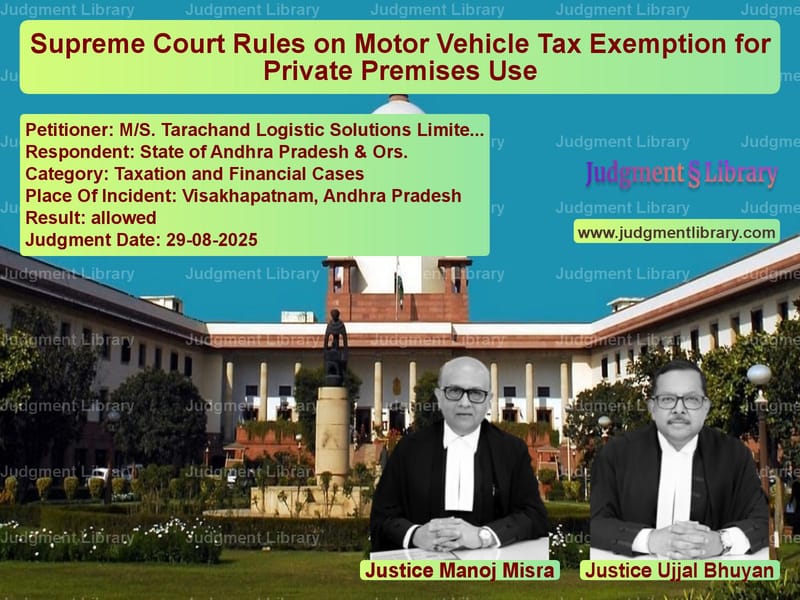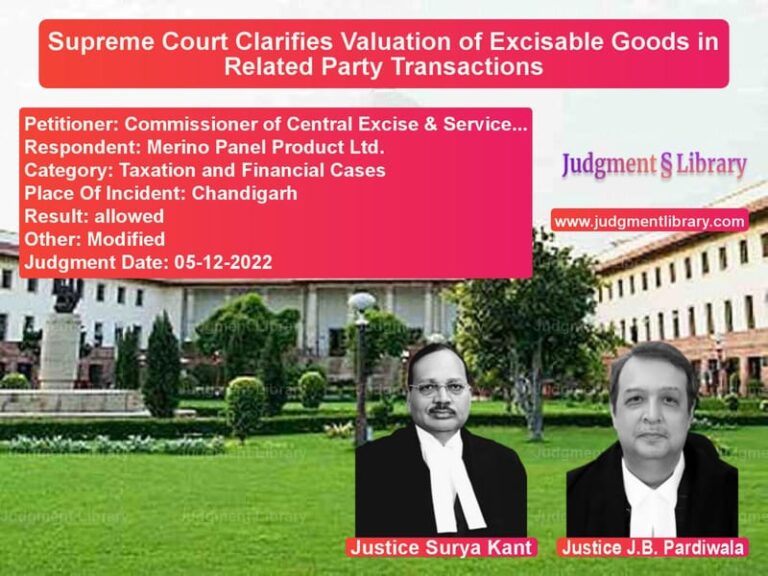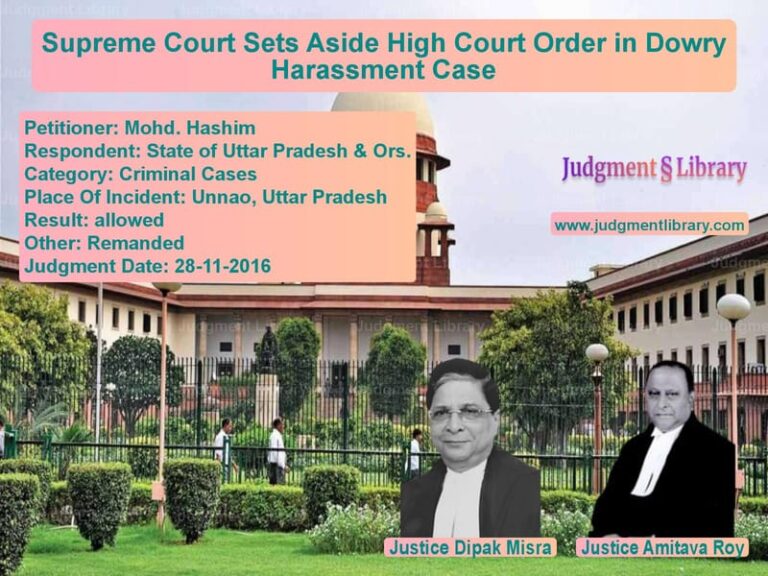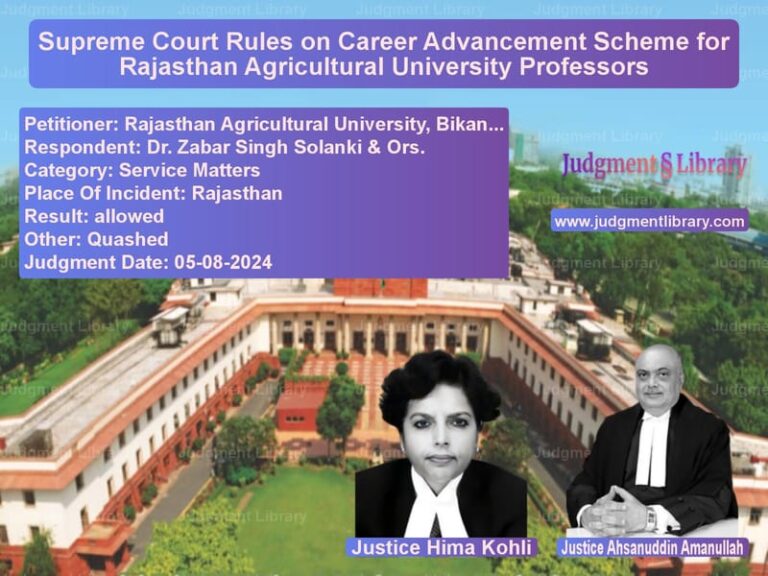Supreme Court Rules on Motor Vehicle Tax Exemption for Private Premises Use
In a significant judgment that clarifies the scope of motor vehicle taxation, the Supreme Court of India recently delivered a landmark verdict on whether vehicles used exclusively within private, restricted premises are liable to pay motor vehicle tax. The case involved M/s Tarachand Logistic Solutions Limited, which had challenged the demand for motor vehicle tax by the State of Andhra Pradesh for vehicles that were used solely within the enclosed premises of Visakhapatnam Steel Plant. The Court’s ruling provides important clarity on the interpretation of ‘public place’ in motor vehicle taxation laws and establishes that vehicles confined to private areas without public access are not subject to such taxes.
The dispute originated when Tarachand Logistic Solutions, which had been awarded a contract for handling and storage operations at Visakhapatnam Steel Plant, deployed 36 motor vehicles exclusively within the plant’s central dispatch yard. The company argued that since these vehicles never left the enclosed premises and weren’t used on public roads, they should be exempt from motor vehicle tax under the Andhra Pradesh Motor Vehicles Taxation Act, 1963. The State authorities, however, maintained that the vehicles were liable for tax regardless of their actual place of use, leading to a legal battle that reached the Supreme Court.
Background of the Case
M/s Tarachand Logistic Solutions Limited, a company engaged in providing logistic support since 1985, was awarded a contract in November 2020 for handling and storage of iron and steel materials at the central dispatch yard within Visakhapatnam Steel Plant. Pursuant to this contract, the company deployed 36 motor vehicles exclusively within the plant premises starting from April 1, 2021. The central dispatch yard was described as an enclosed area with compound walls, regulated access through gates guarded by CISF personnel, and no public right of access without prior authorization.
The company wrote to the State Transport Department in December 2020 and October 2021, seeking exemption from motor vehicle tax on the ground that their vehicles were not being used on public roads. When the authorities didn’t respond but instead raised a demand of Rs. 22,71,700 towards motor vehicle tax, the company paid the amount under protest while reserving its right to seek exemption. After their subsequent representation for refund was rejected, the matter reached the Andhra Pradesh High Court through a writ petition.
The Single Judge of the High Court ruled in favor of the company, holding that the central dispatch yard did not constitute a ‘public place’ and directing refund of the tax amount. However, the Division Bench reversed this decision, leading to the company approaching the Supreme Court.
Arguments by the Appellant Company
Senior counsel Mr. Vijay Hansaria, appearing for Tarachand Logistic Solutions, made detailed submissions focusing on the interpretation of Section 3 of the Andhra Pradesh Motor Vehicles Taxation Act, 1963. He argued that “on a plain reading thereof it is evident that a tax shall be levied on every motor vehicle if three situations are satisfied: (i) the tax is on a motor vehicle; (ii) the motor vehicle is used or kept for use; (iii) in a public place in the State.”
Mr. Hansaria emphasized that “the expression ‘in a public place’ is not only descriptive but also qualifies and limits both the words ‘used’ and ‘kept for use’. Legislature has consciously fastened the liability to pay tax on a motor vehicle keeping in mind that it is being used or kept for use in a public place; liability to pay tax is not on ownership or registration.”
Regarding the expression ‘kept for use’, learned senior counsel submitted that “it means meant for use or intended to be used in a ‘public place’. The motor vehicle must be kept with the intention and purpose of using it in a ‘public place’. Therefore, the primary determinant is the intention for which the motor vehicle is kept. Negatively put, it means that a motor vehicle which is not meant to be used or intended to be used in a ‘public place’ would not attract the tax liability.”
Mr. Hansaria also addressed Rule 12A of the Andhra Pradesh Motor Vehicles Taxation Rules, arguing that “Rule 12A has to be read in conjunction with Section 3. Read together, there is no conflict between the two. However, if a view is taken that Rule 12A is in conflict with Section 3 then the A.P. Rules, 1963 being a subordinate piece of legislation cannot travel beyond the primary legislation. Therefore, the mandate of Section 3 will prevail over Rule 12A.”
He further contended that the central dispatch yard “is evidently a restricted area where the public is not allowed entry without prior permission. The gates are guarded by CISF personnel. As such, central dispatch yard cannot be treated as or deemed to be a ‘public place’ as defined under Section 2(34) of the M.V. Act.”
Arguments by the State Respondents
Learned State counsel Ms. Prerna Singh defended the tax demand, arguing that the appellant company owned 36 vehicles and provided logistical support to RINL on contractual basis. She emphasized that the appellant had paid quarterly road tax for its vehicles up to March 31, 2021, and only subsequently sought exemption.
The State counsel placed heavy reliance on Rule 12A, contending that “the said provision creates a presumption that a vehicle is deemed to be ‘kept for use’ and hence liable for tax. This presumption is only rebutted if and when the owner provides a written intimation of complete stoppage before commencement of the next quarter. Appellant never submitted intimation of stoppage as required under Rule 12A.”
She also argued that “actual use of public roads is not a condition precedent for the levy of motor vehicle tax. That apart, appellant had admitted that though its vehicles would ply within the RINL premises, it would incidentally use public roads outside the premises within a radius of a few meters.”
Ms. Singh further submitted that “appellant had been collecting hiring charges from RINL which included motor vehicle tax. This would indicate that the burden of tax had shifted to the consumer. Therefore, appellant would not be justified to seek exemption.”
Supreme Court’s Analysis and Reasoning
The Supreme Court, comprising Justices Manoj Misra and Ujjal Bhuyan, began its analysis by examining the relevant legal provisions. The Court noted that Section 3(1) of the Andhra Pradesh Motor Vehicles Taxation Act, 1963 provides that “The Government may, by notification, from time to time, direct that a tax shall be levied on every motor vehicle used or kept for use, in a public place in the State.”
The Court emphasized that “Focus of sub-section (1) of Section 3 is on the motor vehicle which is used or kept for use in a ‘public place’ in the State.” The Court then examined the definition of ‘public place’ under Section 2(34) of the Motor Vehicles Act, 1988, which means “a road, street, way or other place, whether a thoroughfare or not, to which the public have a right of access.”
The Court extensively discussed the three-Judge Bench decision in Bolani Ores Limited Vs. State of Orissa, noting that “this Court has categorically held that if the public have no right of access to any place which is not a road, street, way or thoroughfare, it will not be a ‘public place’. A motor vehicle which is not adopted for use upon roads to which the public have no right of access is not a motor vehicle.”
Regarding Rule 12A, the Court observed that “there is omission of the expression ‘public place’ in the said rule. Opening words of the said rule are: ‘for the purpose of Section 3 of the Act’. Thus, the purpose of Rule 12A is to give effect to Section 3. It is trite law that a rule cannot traverse beyond the scope and ambit of the parent statute.”
The Court made a crucial observation about the nature of motor vehicle tax, stating that “Motor vehicle tax is compensatory in nature. It has a direct nexus with the end use. The rationale for levy of motor vehicle tax is that a person who is using public infrastructure, such as, roads, highways etc. has to pay for such usage.”
The Court further elaborated that “Legislature has consciously used the expression ‘public place’ in Section 3. If a motor vehicle is not used in a ‘public place’ or not kept for use in a ‘public place’ then the person concerned is not deriving benefit from the public infrastructure; therefore, he should not be burdened with the motor vehicle tax for such period.”
Key Legal Principles Established
The Supreme Court reiterated several fundamental principles of taxation law in its judgment. The Court emphasized that “Article 265 of the Constitution provides that no tax shall be levied or collected except by authority of law. Thus, what Article 265 contemplates is that: (i) there must be a law; (ii) that law must authorize levy of tax; and (iii) the tax has to be levied or collected so authorized.”
The Court further stated that “Levy of tax has to be explicit. There cannot be exaction of tax by implication or by following an interpretative process. It is trite law that the charging section is the core of a taxing statute. Generally speaking, a taxing statute has to be construed literally; this is more so in the case of a charging section.”
Quoting from Commissioner of Customs Vs. Dilip Kumar, the Court noted that “insofar taxation statutes are concerned, Court has to apply strict rule of interpretation. Article 265 of the Constitution prohibits the State from extracting tax from the citizens without the authority of law. It is axiomatic that taxation statute has to be interpreted strictly because the State at its whims and fancies cannot burden the citizens without the authority of law.”
Conclusion and Impact
The Supreme Court allowed the appeal and set aside the Division Bench’s judgment, restoring the Single Judge’s order that had directed refund of the tax amount. The Court held that “the motor vehicles in question were used or kept for use only within the restricted premises of RINL which is not a ‘public place’. Therefore, the said vehicles are not liable to be taxed for the period the said vehicles were used or kept for use within the restricted premises of RINL.”
The Court specifically addressed the State’s argument about non-compliance with Rule 12A, stating that “Argument of the respondent that appellant had not intimated non-use of the motor vehicles in terms of Rule 12A does not carry much persuasion in view of what we have discussed supra. Thus, even in the absence of any intimation in terms of Rule 12A, motor vehicles of the appellant cannot be subjected to motor vehicle tax for the period those were used or kept confined within the restricted premises of RINL.”
This judgment establishes an important precedent that motor vehicle tax is leviable only when vehicles are used or kept for use in ‘public places’ as defined under the law. The ruling provides relief to businesses and industries that use vehicles exclusively within their private premises without accessing public roads, ensuring that they are not subjected to taxes meant for compensating the use of public infrastructure.
Petitioner Name: M/S. Tarachand Logistic Solutions Limited.Respondent Name: State of Andhra Pradesh & Ors..Judgment By: Justice Manoj Misra, Justice Ujjal Bhuyan.Place Of Incident: Visakhapatnam, Andhra Pradesh.Judgment Date: 29-08-2025.Result: allowed.
Don’t miss out on the full details! Download the complete judgment in PDF format below and gain valuable insights instantly!
Download Judgment: ms.-tarachand-logis-vs-state-of-andhra-prad-supreme-court-of-india-judgment-dated-29-08-2025.pdf
Directly Download Judgment: Directly download this Judgment
See all petitions in Motor Vehicle Act
See all petitions in Tax Refund Disputes
See all petitions in Judgment by Manoj Misra
See all petitions in Judgment by Ujjal Bhuyan
See all petitions in allowed
See all petitions in supreme court of India judgments August 2025
See all petitions in 2025 judgments
See all posts in Taxation and Financial Cases Category
See all allowed petitions in Taxation and Financial Cases Category
See all Dismissed petitions in Taxation and Financial Cases Category
See all partially allowed petitions in Taxation and Financial Cases Category







